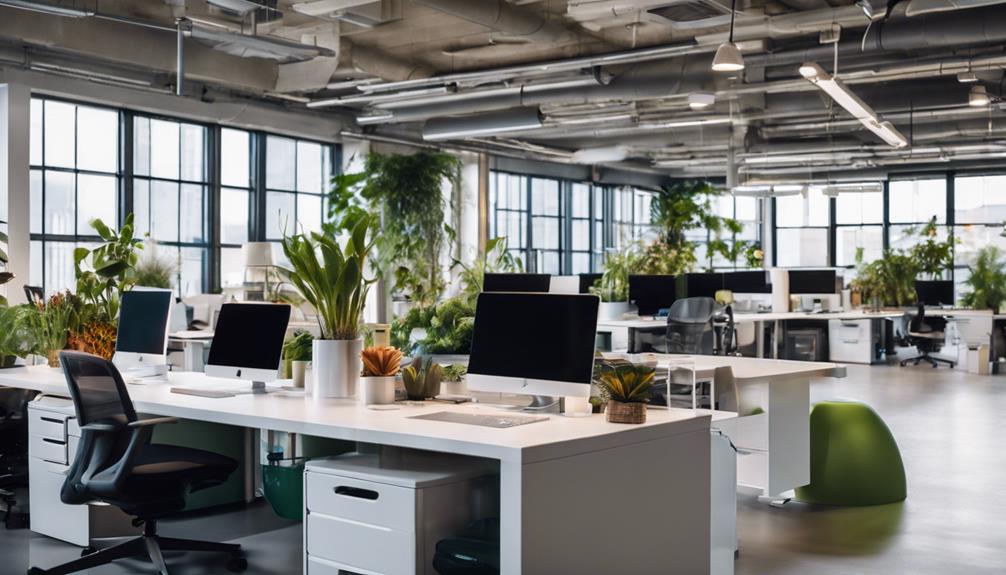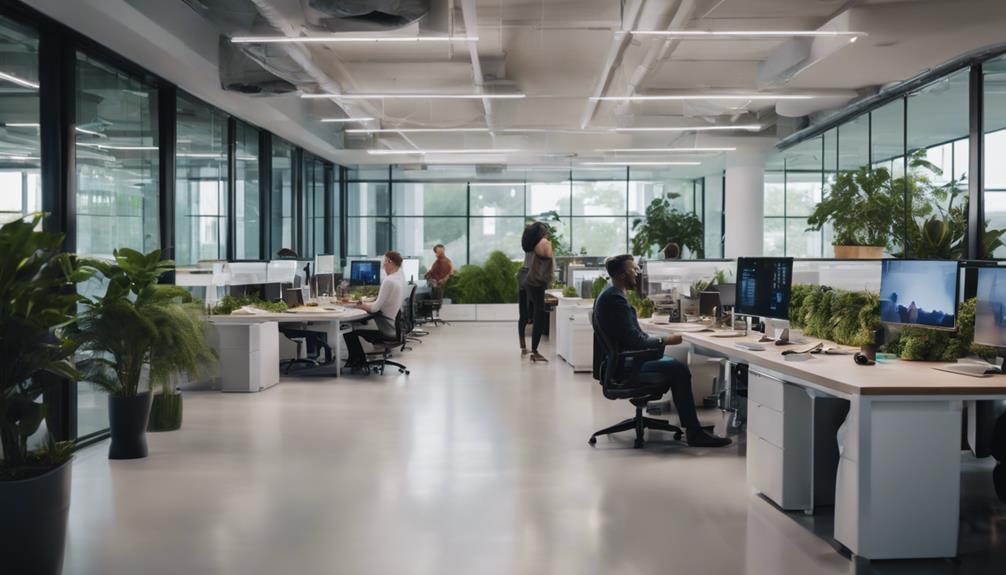You are observing a significant change in office dynamics with Furniture-as-a-Service (FaaS) revolutionizing how you furnish your workspace. This subscription model allows you to prioritize access over ownership, providing flexible solutions for your business requirements. You can easily adjust your office layout by returning or modifying furniture as needed. By eliminating costly upfront expenses, you can allocate funds where they are most needed. The focus on sustainability and wellness promotes eco-friendly choices and creates healthier work environments. FaaS not only simplifies logistics but also enhances productivity. Explore how this innovative approach is reshaping the future of office solutions to meet your evolving needs.
Key Takeaways
- Furniture-as-a-Service (FaaS) offers flexible access to office furnishings, prioritizing adaptability over ownership for modern businesses.
- FaaS reduces upfront costs and simplifies logistics, allowing companies to allocate funds more effectively.
- The model supports dynamic office layouts, enabling businesses to quickly adjust their workspaces based on evolving needs.
- Sustainability is enhanced through FaaS, minimizing waste by promoting rental and reuse of office furniture.
Understanding Furniture-as-a-Service

Understanding Furniture-as-a-Service (FaaS) means embracing a subscription model that prioritizes access to office furniture over ownership, giving you the flexibility to adapt as your business needs change.
With FaaS, you can easily obtain furniture tailored to your specific requirements without the heavy upfront costs. This model allows for temporary or long-term solutions, ensuring you have what you need when you need it.
You won't be tied down by ownership, enabling you to adjust your furniture as your team grows or shifts focus. The service-oriented approach emphasizes meeting your desired outcomes, making it easier to navigate the ever-evolving landscape of office environments.
FaaS is about finding the right pieces to support your business's dynamic nature.
Practical Applications of FaaS
Many businesses are discovering practical applications of Furniture-as-a-Service (FaaS) to create flexible and adaptive office environments that meet their evolving needs.
You can easily transform a collaborative space into individual workstations or vice versa, allowing your team to thrive in the best setup possible.
With FaaS, you can return furniture and adjust your monthly agreements based on fluctuating demands, ensuring you always have what you need without excess.
This model supports dynamic layouts, so whether you're scaling up or down, you're covered.
Advantages for Modern Businesses

Businesses today benefit greatly from the flexibility and cost-effectiveness that Furniture-as-a-Service (FaaS) provides. By reducing upfront capital expenditure, you can allocate funds to other essential areas of your operation.
FaaS simplifies logistics, making it easy for you to manage office furnishings without the hassle of ownership. You gain access to a vast rental inventory, allowing you to adapt quickly to changing workplace trends.
With FaaS, you can effortlessly scale your furniture based on demand, ensuring your office environment remains functional and appealing. Plus, this model supports sustainable practices by minimizing waste from unused furniture.
Key Players in the FaaS Landscape
The landscape of Furniture-as-a-Service (FaaS) is shaped by key players who drive innovation and adaptability in workspace solutions.
You'll find that these leaders are pivotal in providing flexible and efficient office environments. Here are some notable figures in the FaaS sector: Some notable figures in the FaaS sector include Karen Johnson, who has been reimagining executive office design by integrating cutting-edge technology and modern aesthetics. Another influential leader is Michael Chang, who has revolutionized traditional office layouts by implementing customizable workspaces and collaborative areas. These leaders are paving the way for innovative and dynamic office spaces that cater to the evolving needs of modern businesses.
- Melanie Jones: Leads National Commercial Real Estate Business Development, focusing on customer engagement.
- Todd Simpson: Manages the Strategic Business Development team, enhancing partnership opportunities.
- Caleb Parker: Founder of Bold, pushing boundaries in workspace innovation.
- Experienced Teams: Steering shifts in business environments with expertise.
These players are essential in evolving the FaaS model, ensuring it meets contemporary business needs.
Future Trends in Office Solutions

Embracing flexibility and adaptability, future office solutions are set to prioritize collaborative environments and on-demand access to furnishings, reshaping how you think about workspace design. You'll notice a trend towards hybrid layouts that foster both teamwork and individual productivity.
| Trend | Impact on Workspace |
|---|---|
| Increased Remote Work | Demand for adaptable spaces |
| Focus on Wellness | Integration of biophilic design |
| Sustainability Practices | Eco-friendly furniture choices |
| Technology Integration | Smart furniture solutions |
These trends signal a shift from static to dynamic spaces, making it essential for you to rethink how your office can evolve. Expect more customization options, allowing you to create a work environment that truly reflects your team's needs.
Conclusion
In embracing Furniture-as-a-Service, you're not just reimagining your workspace; you're opening up flexibility, boosting productivity, and fostering sustainability.
With FaaS, you can adapt to changing needs, enhance collaboration, and reduce waste—all without the hassles of ownership.
As you step into this new era of office solutions, picture a dynamic environment where your furniture evolves with your business, where every piece supports your goals, and where your workspace truly reflects the future of work.









